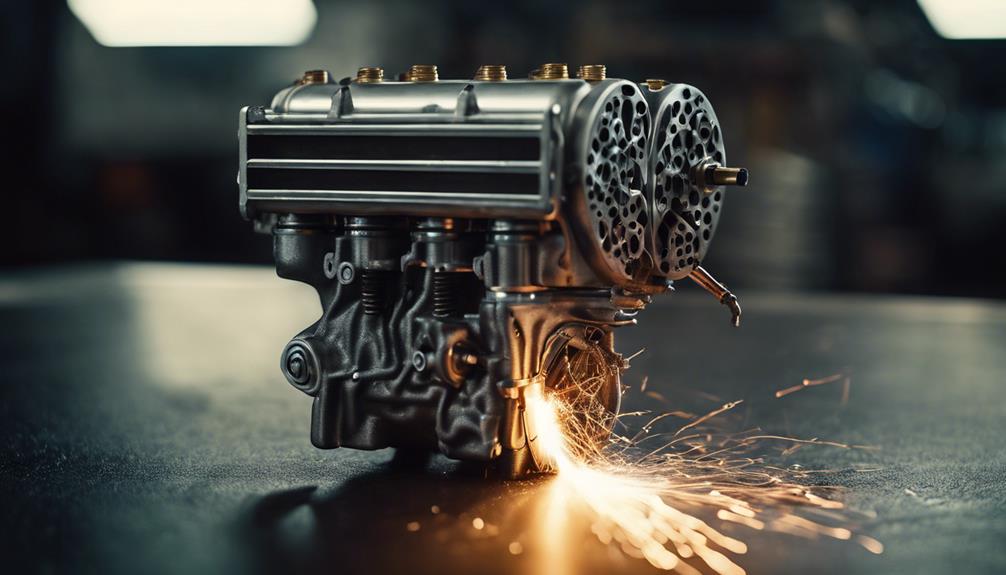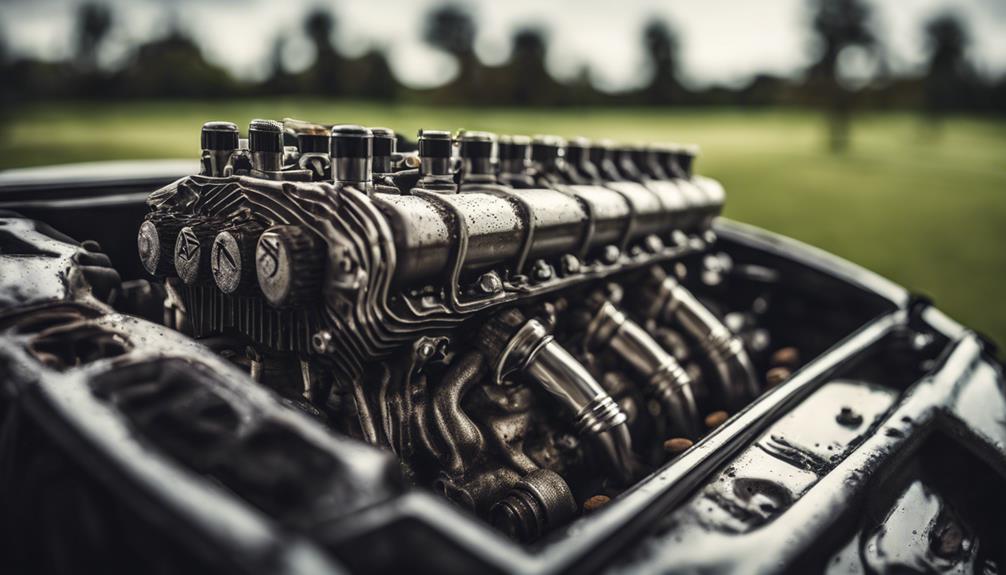- 7 Top Flite Golf Clubs XL for Improved Performance - September 28, 2024
- Top Flite Golf Clubs: Top 5 Reasons to Choose Them - September 28, 2024
- Top 3 Golf Club Fitters for a Perfect Swing - September 28, 2024
As a Golf R owner, you're likely familiar with the thrill of driving a high-performance vehicle, but unfortunately, you're also more prone to encountering common issues that can sap that thrill. You may experience water pump failures, intake camshaft problems, and oil consumption woes. Ignition coil and spark plug problems can also arise, leading to misfires and poor performance. Additionally, wheel bearing noise and failure can impact your driving experience. These issues can be costly and labor-intensive to repair, and timely detection is essential. Stay ahead of these common problems, and you'll be able to maintain your car's performance and your driving satisfaction.
Key Takeaways
- Water pump and thermostat housing issues can cause coolant leaks, overheating, and engine damage due to their prone-to-crack plastic construction.
- Intake camshaft and timing problems can lead to loud noises, poor performance, and check engine light, requiring timely detection and repair for ideal engine function.
- Ignition coils and spark plug neglect can result in misfires, rough idling, and poor performance, making regular maintenance and replacement essential.
- Noisy or failed wheel bearings can negatively impact the driving experience, and prompt replacement is necessary to prevent further damage and ensure safe driving.
- Oil burning and consumption issues are common in Golf R's MQB 1.8t engine, potentially causing carbon build-up and engine damage if left unchecked.
Water Pump and Thermostat Housing
Frequently, Golf R owners face issues with the water pump and thermostat housing, which are prone to cracks and leaks due to their plastic construction. As you own a Golf R, you should be mindful of the symptoms of a failing water pump and thermostat housing, which include coolant leaks, overheating, and potential engine damage if not addressed promptly.
If you notice any of these signs, it's crucial to take action to prevent more severe consequences.
Replacement kits are available for the water pump and thermostat housing, but be prepared for a labor-intensive and costly repair process. Regularly checking coolant levels and monitoring for any signs of leaks can help prevent more severe issues.
Intake Camshaft and Timing Issues
As you explore the intricacies of your Golf R's engine, you'll want to pay close attention to the intake camshaft, a vital component that plays an essential role in timing adjustment for peak engine performance.
This component is responsible for guaranteeing that air and fuel are properly mixed, and any issues with it can lead to subpar performance. Common symptoms of intake camshaft problems include loud noises, poor vehicle performance, and triggering the check engine light.
To diagnose these issues, you'll need to perform live data analysis using tools like OBDeleven. This will help you identify any anomalies in the intake camshaft's timing adjustment, which can be a complex process.
While DIY repair is possible, it's often challenging due to the complexity of the components involved. Timely detection and repair are vital to maintaining ideal engine function in your Golf R. Don't hesitate to address any issues promptly to prevent further damage and ensure your engine runs smoothly.
Ignition Coils and Spark Plug Problems

Your Golf R's ignition coils and spark plugs play a crucial role in its engine ignition system. Neglecting their maintenance can lead to a range of performance issues. These components are responsible for generating the sparks that ignite fuel in the engine. Any problems with them can cause misfires, rough idling, and overall poor engine performance.
To avoid these issues, following the recommended replacement intervals for your Golf R's spark plugs is vital. Typically, this is around every 30,000 to 100,000 miles, depending on the manufacturer's guidelines. Regular maintenance and timely replacement can help prevent more serious engine issues down the line.
Some common signs of ignition coil and spark plug problems in the Golf R include:
- Misfires and rough idling
- Poor engine performance and decreased power
- Difficulty starting the engine
- Illuminated check engine light
Wheel Bearing Noise and Failure
While making sure your Golf R's engine runs smoothly is important, another vital aspect of its overall performance is the condition of its wheel bearings, which can greatly impact your driving experience if they fail or become noisy.
You may notice a loud humming or grinding noise that increases with speed, indicating wheel bearing noise. If left unchecked, this can lead to unsafe driving conditions and potential damage to other components.
Diagnosing wheel bearing issues requires lifting the car, spinning the wheels, and listening for abnormal sounds. However, replacing wheel bearings in the Golf R typically requires specialized tools and knowledge, making it a job best left to experienced mechanics.
Regular maintenance and prompt replacement of worn wheel bearings can prevent further damage and ensure safe driving. It's vital to address wheel bearing noise and failure promptly to avoid compromising your vehicle's performance and safety.
Oil Burning and Consumption Issues

Excessive oil consumption is a common issue in the Golf R's MQB 1.8t engine, a problem that can lead to carbon build-up and potentially cause engine damage if left unchecked. If you're experiencing excessive oil consumption, addressing the issue promptly is crucial to prevent long-term engine damage and enhance the overall reliability of your Golf R.
Here are some key points to keep in mind:
- Low tension piston rings allow more oil to pass through, contributing to excessive oil consumption.
- Carbon build-up can result from increased oil consumption, potentially leading to engine issues.
- Installing updated pistons and rings or replacing the PCV valve are possible solutions to tackle the oil burning problem.
- Conducting an engine flush may help reduce oil consumption and enhance engine performance.
Frequently Asked Questions
What Is the Common Issue With Golf R?
You'll likely encounter issues with your Golf R, including turbo problems, electrical glitches, transmission troubles, cooling system failures, and suspension problems, which can affect engine reliability, fuel economy, brake performance, exhaust system, and interior quality.
Is the VW Golf Type R Reliable?
You'll find the VW Golf R to be reliable, with proper maintenance and care, despite its high-performance nature; it offers smooth power delivery, agile handling, and decent resale value, making it a great choice for enthusiasts.
Is Golf R High Maintenance?
You'll find that your Golf R requires more frequent service intervals, higher maintenance costs, and specialized care to prevent engine problems, suspension issues, and electrical problems, which can be mitigated with warranty coverage and strategic tuning options.
How Long Does a Golf R Last?
You can expect your Golf R to last over 200,000 miles with proper maintenance, as its durability is influenced by factors like driving habits, timely repairs, and environmental conditions, ultimately impacting its performance longevity and resale value.
Conclusion
As you're about to hit the links, you're left wondering: will your Golf R make it through the round without a hitch? Don't be caught off guard by these common issues.
You've now been warned about the water pump and thermostat housing, intake camshaft and timing problems, ignition coils and spark plug woes, wheel bearing noise and failure, and oil burning and consumption issues.
Stay vigilant, and you might just avoid a costly repair bill. But for now, the question remains: what's lurking under the hood, waiting to strike?




